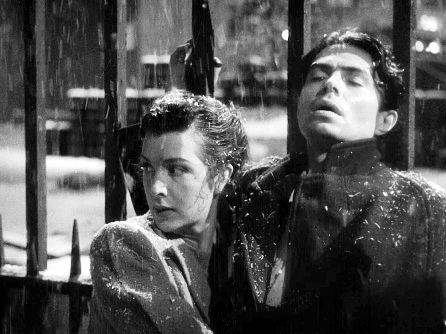 James Mason plays a wounded Irish gunman in Belfast, pursued by a manhunt, in Carol Reed’s tragic and beautiful film from 1947.
James Mason plays a wounded Irish gunman in Belfast, pursued by a manhunt, in Carol Reed’s tragic and beautiful film from 1947.
Odd Man Out, a 1947 film by British director Carol Reed, is that rare work of suspense that conveys a tragic vision. I recently had a chance to see it again, and was struck once more by the film’s humanity and how it brings a profoundly spiritual point of view to a political theme.
James Mason plays Johnny McQueen, the head of an outlawed Irish militia group in Belfast. Recently escaped from prison, he leads a robbery of a linen mill to gain funds for the organization, but the plan goes wrong, he shoots a cashier dead and is wounded himself. While his partners get away, he hides out in a nearby bomb shelter. As day turns to night, and rain to snow, a city-wide police manhunt begins for him, while his friends desperately try to find him and take him to safety. Most distressed of all is the young woman Kathleen, played by Kathleen Ryan, who loves Johnny and will do whatever it takes to protect him.
Odd Man Out gradually becomes an odyssey of pain, in which Johnny stumbles into the company of different residents of the city, of different views and backgrounds, all of whom must make a decision about what to do with him. Mason is almost mute through most of the movie, his wounded character slipping in and out of delirium—yet it’s a remarkable, haunting performance. By the time Johnny finds himself in the studio of a half-mad artist played by Robert Newton, who wants only to paint him because of the death in his eyes, he has become a symbol of everyone’s desires, hopes, and fears. A sudden moment of vision in which Mason recites a passage from Corinthians that transforms hate and rebellion into love and faith, is a stunning epiphany.
The story is from a novel by F.L. Green, who adapted it with R.C. Sheriff, and the dialogue is sharp and full of poetic resonance. Robert Krasker’s black and white cinematography is full of deep focus and contrasts, long shots of shadows and dark alleys and ghost-like perspectives. Reed weaves the multi-character tale into a beautiful web of meanings: the desperation of love, the selfishness and cruelty of the slums, the heightened, almost mad vision of the man who faces death directly. Odd Man Out has all that, and a shattering, unforgettable ending as well.

I’ve mentioned before how films will come and go, sometimes disappearing after only a week, so that I don’t have a chance to review...

Riz Ahmed plays a rock drummer who loses his hearing and must come to terms with being a deaf person, in Darius Marder’s moving...

Two young undocumented immigrants from Africa struggle to get by in Belgium, exploited at every turn, and with only each other for support. The...